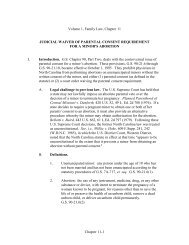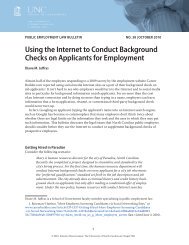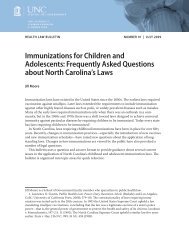administration of justice bulletin - School of Government Bookstore ...
administration of justice bulletin - School of Government Bookstore ...
administration of justice bulletin - School of Government Bookstore ...
You also want an ePaper? Increase the reach of your titles
YUMPU automatically turns print PDFs into web optimized ePapers that Google loves.
Administration <strong>of</strong> Justice Bulletin 2007/05 September 2007<br />
When the Petitioner is a Physician or<br />
Psychologist<br />
When the petitioner is a physician or psychologist 71<br />
who has already examined the respondent and has<br />
made a specific recommendation as to the<br />
respondent’s disposition and the magistrate finds<br />
reasonable grounds supporting the recommendation,<br />
then the order the magistrate issues depends on the<br />
examiner’s recommendation for disposition, which is<br />
found in Section III <strong>of</strong> “Examination and<br />
Recommendation to Determine Necessity for<br />
Involuntary Commitment” (DMH 5-72-01). If the<br />
examination form is not attached and the physician<br />
has not specified the type <strong>of</strong> commitment—mentally<br />
ill and dangerous; mentally ill and in need <strong>of</strong><br />
treatment; or substance abuser and dangerous—the<br />
magistrate must determine which type <strong>of</strong><br />
commitment the facts support.<br />
When the physician or psychologist<br />
recommends inpatient commitment<br />
If the physician or psychologist petitioner<br />
recommends inpatient commitment and the<br />
magistrate finds reasonable grounds to affirm that<br />
recommendation, the magistrate must issue the<br />
regular custody order (AOC-SP-302), make the<br />
appropriate finding, and check the box in the order<br />
directing the law enforcement <strong>of</strong>ficer to transport the<br />
respondent directly to a designated 24-hour facility<br />
for examination and custody pending a district court<br />
hearing (box 2). 72 There is no need to take the<br />
respondent to a local examiner because the physician<br />
or psychologist petitioner has already performed that<br />
examination.<br />
When the physician or psychologist<br />
recommends outpatient commitment<br />
If the physician or psychologist petitioner<br />
recommends outpatient commitment and the<br />
magistrate finds reasonable grounds to affirm the<br />
recommendation, the magistrate does not issue a<br />
custody order because the respondent will not be<br />
taken into custody. Rather, the magistrate issues the<br />
order entitled “Findings and Order Involuntary<br />
Commitment Physician-Petitioner Recommends<br />
Outpatient Commitment” (AOC-SP-305), which<br />
requires hearing a district court judge to hold a<br />
hearing to determine whether the respondent will be<br />
71. See supra note 59.<br />
72. G.S. 122C-261(d).<br />
involuntarily committed to outpatient treatment. 73<br />
The clerk will issue a notice <strong>of</strong> hearing to the<br />
respondent. 74<br />
Outpatient commitment means treatment in an<br />
outpatient setting and may include medication,<br />
individual or group therapy, day or partial day<br />
programming activities, services and training<br />
including educational and vocational activities,<br />
supervision or living arrangements, and any other<br />
services prescribed either to alleviate the individual’s<br />
illness or disability, maintain semi-independent<br />
functioning, or to prevent further deterioration that<br />
may reasonably be predicted to result in the need for<br />
inpatient commitment to a 24-hour facility. 75<br />
When the physician or psychologist<br />
recommends substance abuse commitment<br />
If the physician or psychologist petitioner<br />
recommends substance abuse commitment and the<br />
magistrate finds reasonable grounds to affirm that<br />
recommendation, the type <strong>of</strong> order issued by the<br />
magistrate depends upon the recommendation <strong>of</strong> the<br />
physician or eligible psychologist as stated in the<br />
“Examination and Recommendation” form. 76 If the<br />
physician recommends that the respondent be held at<br />
a 24-hour facility, the magistrate issues a custody<br />
order to transport the respondent directly to the<br />
designated 24-hour facility for examination and<br />
custody pending a district court hearing AOC-SP-<br />
302, block 2). If the physician recommends that the<br />
respondent be released pending a hearing, the<br />
magistrate issues an order that a hearing before a<br />
district court judge be held to determine whether the<br />
respondent will be involuntarily committed (AOC-<br />
SP-305).<br />
Designate the 24-Hour Facility To Which<br />
Respondent Taken<br />
In the final part <strong>of</strong> the first page <strong>of</strong> the custody order,<br />
the magistrate must fill in the name <strong>of</strong> the designated<br />
24-hour facility 77 to which the respondent may be<br />
73. Id.<br />
74. The form is “Notice <strong>of</strong> Hearing/Rehearing for<br />
Involuntary Commitment,” AOC-SP-301.<br />
75. G.S. 122C-3(27).<br />
76. G.S. 122C-281(d). The number <strong>of</strong> the form is<br />
DMH 5-72-01.<br />
77. Under G.S. 122C-252 hospitals must be designated<br />
by the Secretary <strong>of</strong> Health and Human Resources to receive<br />
and treat involuntarily committed respondents. Any facility<br />
14













